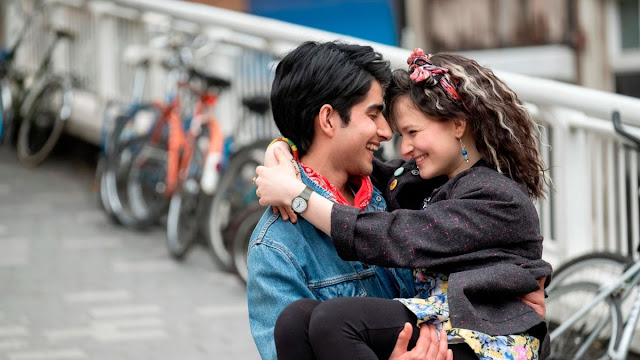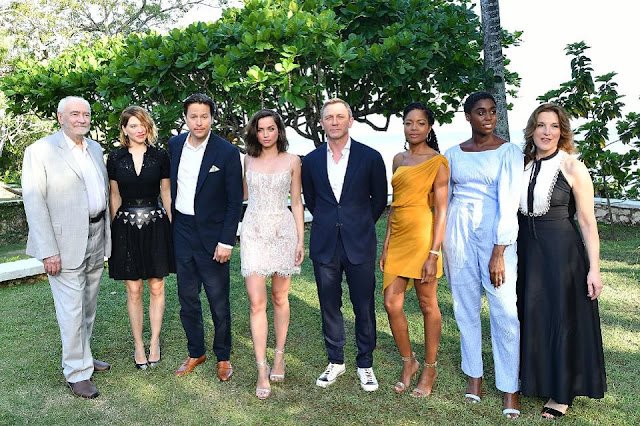Blinded By The Light: Review
A delightful, coming-of-age drama that celebrates the power of music, making you fall in love with Springsteen and yourself once again
 |
Viveik Kalra and Nell Williams in 'Blinded By The Light' (CREDIT: Entertainment One)
|
by Jack Linsdell
Over the last few years, musicals (both jukebox, biopic and original) have been the only "type" of films to score at the box office alongside the superhero tentpoles and horror flicks. A vast number of these have been musical-biopics celebrating an artist's life (Bohemian Rhapsody, Rocketman) or using an artist's music with an original story (Mamma Mia: Here We Go Again, Yesterday), and (part of) the reason they've broken big is due to the popularity of the artist/music they're based on. We've had the life and/or music of Queen, Elton John, The Beatles and ABBA, some of the biggest names in music, and now it's the turn of Bruce Springsteen.
Blinded by the Light is a new sort of musical, in that unlike Rocketman it doesn't break out into big dance numbers and unlike Yesterday, the songs are actually integral to the plot (how a musical should be written). But, as the latter has just soared over $126 million worldwide (on a $26 budget), Blinded by the Light which is a vastly superior movie (and musical), will struggle to double it's $15 million production budget in worldwide grosses. This is yet another example where the "better" and "cheaper" movies in cinemas play to fewer numbers whilst the pulpy, flawed and bigger-scale flicks have packed screens. However, I was pleased that my Saturday night screening was (mostly) packed.
Inspired by the true childhood experiences of a British-Pakistani, Muslim, journalist Sarfraz Manzoor, we find our teenager Javed (Viveik Kalra) trapped in Luton during Thatcherite Britain in 1987. He's sitting on a hill by the Luton junction on the M1 motorway with his best friend Matt (Dean-Charles Chapman), staring at the city of opportunity that is London in the distance. This hill and viewpoint are visited numerous times by our characters throughout the film, reminding us of his deep-rooted dream to leave the town that's become his prison. The slave of his domineering father, whose trying to keep his family together despite being the victim of frequent racism from the National Front Movement and the high unemployment of the government cuts, and struggling to become the writer he wants to be with the worker his family need him to be, it's safe to say that Javed isn't happy. With encouragement from his English teacher (Haley Atwell), but pressure from his Dad, Javed is stuck until he's introduced to the music of Bruce Springsteen (known as The Boss) by Roops, who gives him two of his tapes.
Listening to the songs, Javed finds new life and solace in The Boss's lyrics, shocked that a white, American country singer could possibly know what he was experiencing as a minority in a small town across the Atlantic. This gives Javed new confidence, allowing him to pick up his first girlfriend Eliza (Nell Williams) and stand-up to his Dad for the career and life he wants to leave. As I mentioned earlier, the closest we get to a musical number is Javed, Roops and Eliza running around Luton with their newfound freedom performing 'Born to Run', and that's great because the film relies on the power of the lyrics (and their meaning to Javed) to provide the musical entertainment, not big, colourful dance ensembles. This is cleverly done, with stylish denotation of on-screen and director Gurinder Chadha holding the camera on our protagonist's face as the lyrics sink in and empower him. Chadha is proving to be a very underrated and talented filmmaker, whose break-through hit Bend it like Beckham now feels like a stepping stone to this movie. The two have parallels; both show a Muslim family struggling in Britain, with a child who goes against their parents wishes to pursue a career they want (football = writing), eventually ending up in America. It seems to be a theme that Chadha likes to explore (the struggle of Muslim's living in Britain, but also finding freedom/acceptance in their own families) time and time again, and has shown that she can do it brilliantly in the sports drama or family-musical flick.
Chadha co-penned the script with her long-time writing partner Paul Mayeda Berges and the journalist whose life inspired the film Manzoor, and the thing I admired most about was it's heart and ability to use the events of the 1980's as a backboard not a catalyst. Despite the challenges thrown to characters from society, it's Javed and his Dad's mistakes that create an emotional and uplifting climax and their struggles to get there, not anything else. But, Chadha and co. manage to weave in the Great Storm of 1987 and the National Front riots as key events from the time so poignantly into the movie that it's very admirable. It would've been easy to shove the racism card or poverty line down our throats, but instead the focus remains on our characters and how they deal with these events, and when we do notice these things, it's poetically done. It's a very solid screenplay, one that really works best as a family, coming-of-age drama (which many regular readers know I believe is the best genre of film out there) and the sharp dialogue and compelling characters build us up to Javed's tear-jerking speech at school (no spoilers) at the climax, allowing us to leave the cinema feeling fulfilled.
But, our actors are most impressive here. Kalra's performance of Javid is phenomenal, capturing his confusion, frustration, joy and adulation all in such a visual, charming way that it's hard not to instantly fall in love with his character. His chemistry with Williams is superb, capturing that raw and passionate relationship that develops when you first fall in love. William's is another rising star that deserves to be watched in the future, as both our leads here really sell the "love story" part of the film, bringing their new talent and energy into roles that could very easily have become too dramatic. They managed to keep the humanity and innocence in their teenage characters, and for that they get a lot of respect. Javed's Dad, Malik (Kulvinder Ghir) is another big standout, and truly sells his "steely appearance yet soft on the inside" character so brilliantly, culminating in a really powerful standoff with Javed in the beginning of the third act that reminds you of Taraji P. Henson's performance in Hidden Figures when she questions her write to go to the toilet across the compound.
The other notable thing is that Blinded by the Light is a story by a minority, female filmmaker, about minority people and deserves your financial support at the cinema. If you want inclusivity and onscreen diversity, it's movies like this that are championing it. If you skip this one, but catch the white, male led and directed Hobbs & Shaw in the next screen, yet sit at home on Twitter complaining about the lack of movies for those unused to seeing their stories told on camera, then shame on you. By all means see the tentpole flicks, but when movies like this one are as good as they are, they deserve your attention folks, so make an extra trip. It's better than Yesterday, yet will earn 10 times less at the box office. The power's in your hands, people.
Blinded by the Light will probably hit home the biggest with fans of Springsteen, the 1980's period, and with those of Muslim heritage/descent. But, considering I'm none of the above, the movie absolutely sold all three elements to me, because it is a fine example where the coming-of-age, family drama when done well, can make any character, from any era and any background so relatable that you see yourself on that cinema screen. That's why they're the best "type" of movie out there. Yes, it's tremendously well shot, compelling well written, and outstandingly acted. But, it's decision to put characters over cheap entertainment value and period clichés, allows it to become a new sort of musical. One that doesn't make you stand up and dance, but one that makes you smile and reflect.
5/5 STARS


Comments
Post a Comment